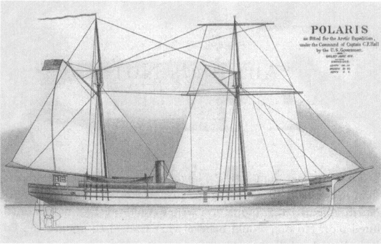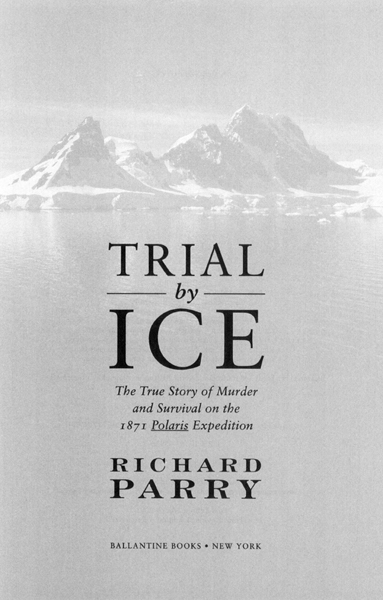David Stevenson's artistic rendering of the book's jacket unerringly depicts the danger and uncertainty that must have terrorized the ship's crew. Jie Yang as production manager and Nancy Delia as production editor deserve special recognition for transforming the manuscript into print.
As always, my thanks to my agent, David Hale Smith of DHS Literary, Inc., for his unwavering faith and support.
I would also like to thank Robin Benway, Marie Coolman, and Kim Hovey of the Ballantine Publishing Group for their help in publicizing my work. Last but not least, a special thanks to Joanne Miller, my Arizona publicist, for beating the desert on my behalf.
A UTHOR'S N OTE
Truth is stranger than fiction. Nowhere is that statement more true than in the facts surrounding the first American expedition to the North Pole in 1871. No fiction writer could invent a more convoluted plot. No one would believe what transpired aboard the Polaris. Yet what follows is true.
The events that led to the death of the expedition's leader, Charles Francis Hall, the disaster that left half the crew adrift on an ice floe in the dead of the Arctic winter, the folly that eventually sank the Polaris might read like a fantastic murder mystery or a Greek tragedy; nonetheless, what transpired is well documented. The plot contains all the elements of an epic novel: a glorious purpose; a journey led by a noble and dedicated man; a mission destroyed by treachery and the darker sides of human nature; a battle of man against the heartless elements, where unimaginable conditions degrade the best ideals humanity has to offer until those trapped sank to the level of considering cannibalism; embarrassed people in positions of power moving hastily to protect their own interests at the expense of the truth.
Even the dialogue is true, taken from the men's testimony at the inquiries following their return to the United States, their written journals and diaries, and their published accounts of the ordeal they endured. What these men had to say reveals the exciting truth of an expedition gone fatally wrong. Throughout the series of mistakes and misdeeds that plagued the Polaris, one fascinating truth emerges: miraculously, not all the men were lost. Despite the volume of material available that recorded these exploits, several puzzling questions remain. How could these men have such widely divergent perceptions of the events that took place? Who or what was ultimately responsible for Charles Francis Hall's death? And perhaps most troubling of all, how much did the extremity of the conditions they endured and the imperfections in their troubled souls contribute to their collective and individual failure?

The select bibliography in the back of this book lists only the books from which direct quotations were used. An effort was made to use material published close to the time of the disaster so as to avoid the subtle variations in meaning that result over the passage of time. The list is by no means a complete record of all the resources consulted. In regard to the scientific, nautical, medical, and polar explanations, I drew upon my personal reading, my experience sailing in the Arctic, thirty years of medical practice, and the twenty years I lived in Alaska.
The astute reader will note the variation in spelling of places and persons in this work. This is due to the different spellings used in the historical references of the time. Within the body of the text all effort has been made to use the modern spelling, such as Disko for Disco, but the quotations retain the exact spelling used in those works.
C ORRECTED M USTER R OLL
OF THE P OLARIS E XPEDITION
Corrected Muster Roll of the Polaris Expedition Corrected muster roll of the Polaris expedition as made out by Captain Hall on July 2, 1871, and forwarded by him to the secretary of the navy. (Nationalities added by the author.)
| C. F. Hall | Commander |
| Sidney O. Buddington | Sailing and Ice Master |
| George Tyson | Assistant Navigator |
| H. C. Chester | First Mate |
| William Morton | Second Mate |
| Emil Schuman | Chief Engineer (German) |
| Alvin A. Odell | Assistant Engineer |
| Walter F. Campbell | Fireman |
| John W. Booth | Fireman |
| John Herron | Steward (former British citizen) |
| William Jackson | Cook |
| Nathan J. Coffin | Carpenter |
Seamen
| Herman Sieman (German) | Joseph B. Mauch (German) |
| Frederick Anthing (Russian/German) | G. W. Lindquist (Swedish) |
| J.W.C. Kruger (German) | Peter Johnson (Danish) |
| Henry Hobby | Frederick Jamka (German) |
| William Lindermann (German) | Noah Hayes |
Scientific Corps
| Emil Bessel | Surgeon and Chief of Scientific Corps (German) |
| R.W.D. Bryan | Astronomer and Chaplain |
| Frederick Meyer | Meteorologist (German) |

T RAGEDY
I believe that no man can retain the use of his faculties during one long night to such a degree as to be morally responsible.
N OAH H AYES , S EAMAN , P OLARIS E XPEDITION , 1871
November 10, 1871. The black sky leaned heavily upon the land. So dark was the air that the earth glowed brightly by contrasta pale, ethereal light radiated from the ground itself. Faint blue and violet shapes of snow-covered earth blended with wildly strewn blocks of ice littered the landscape. Without distinction solid land and frozen water, sky and earth floated together into one shimmering, surreal dream.
But this was no dream. This was the Arctic winter, and a nightmare for the weary procession that wended its way over the ice. Led by a single figure holding a lantern, which cast a feeble light and flickering glow that the cold air quickly swallowed, the party moved slowly across the snow in a broken column. Behind them rose the dark hulk of their ice-locked ship, the
















